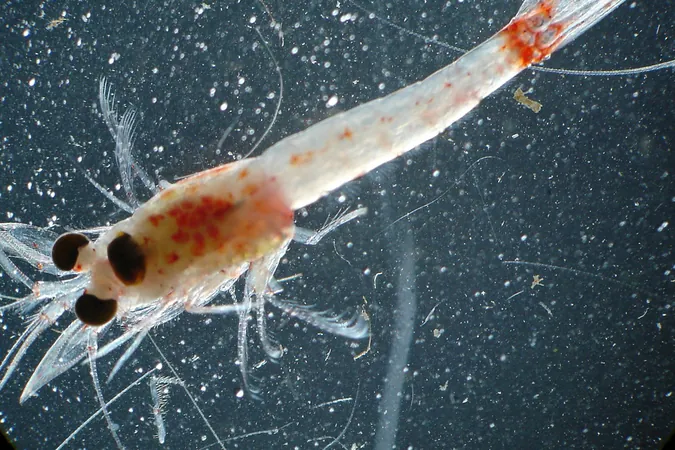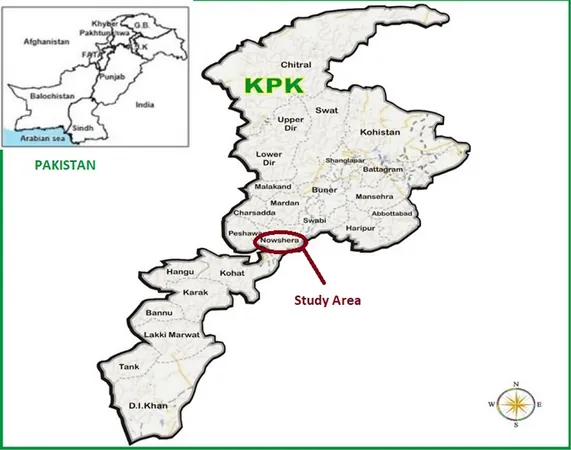
Groundbreaking Study Reveals Mysid Meal as a Game-Changer for Shrimp Farming!
2024-11-18
Author: John Tan
A recent study has unveiled that mysid meal can serve as a remarkable substitute for traditional fishmeal in the diets of Pacific white shrimp (Penaeus vannamei) postlarvae, promoting significant growth at replacement levels reaching up to 65.50%. This raises a hopeful prospect for the aquaculture industry, which is grappling with the sustainability of conventional feed sources.
Zooplankton is increasingly being hailed as a viable and sustainable feed option for aquaculture, thanks to its exceptional nutritional profile similar to that of fishmeal. Interestingly, the global production of zooplankton biomass amounts to hundreds of millions of tons annually. Astonishingly, a substantial portion of this biomass remains underutilized, presenting an opportunity to leverage this rich resource that is often discarded as waste.
Among the lesser-known, underutilized species of zooplankton, mysid shrimp stands out due to its high calorific value and nutritional content, which consists of 52% to 75% protein. Additionally, due to its short reproductive cycle and ease of cultivation, mysid shrimp can be a significant resource for aquaculture feeds.
While mysids are frequently overlooked, they have emerged as a promising source of live feed for the nursery culture of marine fish. However, the nutritional value of mysid meal in replacing fishmeal for shrimp diets has thus far not been extensively studied—until now.
Study Insights
Conducted at the Multispecies Hatchery Complex of the University of the Philippines Visayas, the research employed an intricate experimental design featuring twenty 60-liter tanks over a 60-day culture period. Wild mysids were sourced locally, turned into meal, and included in five different diets with varying levels of mysid replacement for fishmeal.
This pioneering study is the first of its kind to analyze and document the nutritional benefits of mysid meal in the diets of P. vannamei. The analysis revealed that the amino acid profile of mysid meal is not only complete but often exceeds the amino acid composition found in the muscle protein of the shrimp. Notably, the essential amino acids (EAAs) present in mysid meal meet the shrimp's dietary requirements, ensuring optimal growth.
The study's results indicate that mysid meal can entirely replace fishmeal without negatively impacting shrimp growth or feed efficiency, a finding that marks a significant milestone in aquaculture. Interestingly, shrimp receiving diets containing 100% mysid meal performed just as well as those given traditional fishmeal diets. Notably, mysid-fed shrimp exhibited improved protein and lipid retention compared to their fishmeal-only counterparts.
Researchers concluded that mysid meal not only promotes better protein retention—a critical indicator of dietary efficacy—but also enhances overall survival rates under varying dietary conditions.
Future Implications
The conclusion is clear: mysid meal could revolutionize shrimp farming by becoming a staple feed ingredient, alleviating pressure on dwindling fish stocks and ensuring sustainable aquaculture practices. The study's findings not only encourage further exploration into mysid shrimp as a feed source but also herald a new era in aquaculture, where innovation meets sustainability in the quest to meet global seafood demands.
With the continued growth of the aquaculture industry, the exploration of alternative protein sources like mysid meal is not just beneficial—it's essential for the future sustainability of ocean resources. Could this be the breakthrough that reshapes the future of seafood production? Only time will tell.

 Brasil (PT)
Brasil (PT)
 Canada (EN)
Canada (EN)
 Chile (ES)
Chile (ES)
 España (ES)
España (ES)
 France (FR)
France (FR)
 Hong Kong (EN)
Hong Kong (EN)
 Italia (IT)
Italia (IT)
 日本 (JA)
日本 (JA)
 Magyarország (HU)
Magyarország (HU)
 Norge (NO)
Norge (NO)
 Polska (PL)
Polska (PL)
 Schweiz (DE)
Schweiz (DE)
 Singapore (EN)
Singapore (EN)
 Sverige (SV)
Sverige (SV)
 Suomi (FI)
Suomi (FI)
 Türkiye (TR)
Türkiye (TR)